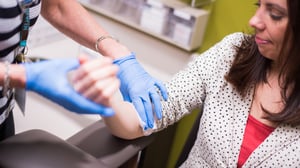Hypertension is a term that some people have heard, but they are often confused about its meaning and who it affects. The simple definition is consistently elevated blood pressure. For example, when a person’s blood pressure is consistently greater than 130-140 over 80-90, (systolic over diastolic blood pressure), that’s when we might begin to get concerned. We may ask patients to make some behavior changes.
When someone has chronic high blood pressure, we often recommend medications to try to bring their blood pressure down. This can help reduce the risk of complications, such as, heart attacks, stroke, kidney damage and more.

What are the risk factors of hypertension, and are people aware of them?
Many of the people that are diagnosed with high blood pressure become aware of their condition when they are being seen for something unrelated. They are often surprised to discover they have hypertension. Many people aren’t aware of a possible family history of hypertension until they start digging into their background after a diagnosis is made.
In addition to having a family history of hypertension, other risk factors include lifestyle choices such as lack of exercise, excessive alcohol use, and poor diet.
Another huge risk factor is stress. The subtle stressors that we undergo every single day — housing stressors, financial stressors, family stressors, occupational stressors — can all contribute to the development of high blood pressure over a period of time. The same goes for the stress and anxiety caused by the coronavirus outbreak.
Vera whole health coaches are ready to help if you need a partner to help you manage your stress in this challenging time.

You’ve been diagnosed with hypertension. Now what?
Depending on your risk factors for developing hypertension, the next steps can vary. For example, some people are genetically predisposed to developing hypertension. It can start as early as the teenage years, even in people who are otherwise completely healthy. In these chronic type cases, we often will recommend medications to try to bring blood pressure down and reduce the risks of possible complications.
For others, a hypertension diagnosis is related to a person’s lifestyle. For these types of cases, significant improvements can be made by making lifestyle changes. For example, getting regular exercise, plenty of sleep, eating a plant-based diet, and avoiding alcohol can all reduce the effects of hypertension.
Recognizing the warning signs
Awareness is power. Be cognizant of warning signs like blurred vision, headache, and feelings of constant fatigue. If you notice heart palpitations or feeling like your heart is pounding, that may also be cause for concern.

Prevention: what you can do
Preventing hypertension is possible in many patients. Here are some things you can start doing now:
- Get in the habit of checking your blood pressure
Start early, when you’re in your 20s and 30s, at least once a year. And, if you have a family history of high blood pressure, be sure that you get checked regularly and make sure that your blood pressure is within normal range and not elevating over time. - Keep track of your BMI
Weight maintenance is a key way you can reduce your risk. - Stop smoking
Smoking contributes to calcification of the arteries. - Get moving
Regular exercise reduces your risk of hypertension. - Manage your stress
Keep calm and your blood pressure will too. If you need help for this during the coronavirus outbreak, our Vera health coaches are standing by to help. - Nourish your body with nutrition
Plant-based, whole food diets reduce your risk of high blood pressure.
Knowing the warning signs of hypertension, the risk factors, and how you can prevent this condition will go a long way in your journey to being your healthiest self. Schedule an appointment with your Vera provider today for more information.
Sign up
Join our email list to receive the latest open positions, Vera Careers news, and more.





